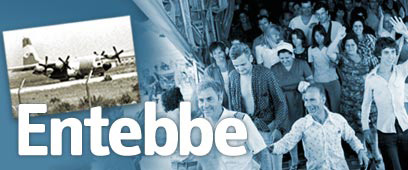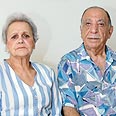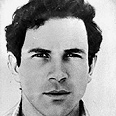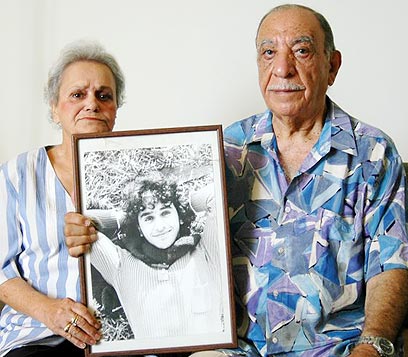

Grieving parents Rachel and Robert
Photo: Niv Calderon

Yoni Netanyahu. Wasn't forgotten
Photo: GPO
Special: Entebbe's unsung hero
In some Israeli homes, anniversary of Entebbe Campaign is day of mourning, while media rarely mentions four hostages who died. In conversation with Ynet, Maimoni family, whose son Jean Jacques, 19, was killed by friendly fire, discusses its grief and anger thirty years on
Part 3 in a series: On July 4, 1976, at four in the morning, a thrilled Robert Maimoni roused his sleeping family in their apartment in Netanya. “They announced on the radio that the IDF freed the hostages in Entebbe and that they are on their way to Israel,” he exclaimed. Robert, his wife Rachel and their daughter Martine hurried happily to the airport to greet their son Jean-Jacques Maimoni, 19. When they arrived, they began searching for him among the hostages busily embracing their loved ones.
In the meantime, the terrorists sorted their hostages, in a manner that conjured up nightmarish images of Nazi selections. Jews and Israelis were directed to the right, and French citizens and everyone else were sent to the left. As the bearer of a French passport, Jean-Jacques could have probably saved his own life. Several passengers later testified that he had insisted on turning to the right and had stated: ‘I am an Israeli and a Jew.’ His friend, the consul’s son, went to the left and was released with the other foreigners.

Parents holding Jean Jacques' picture. 'I will never forger scene in airport' (Photo: Niv Calderon)
“For the rest of my life, I will never forget that scene in the airport. Everyone was hugging, emotionally crying. Suddenly, I heard on the loudspeaker: ‘The Maimoni family is requested to come to room such-and-such.’ We entered the room, and there they told us that Jean-Jacques had been killed during the rescue mission,” his sister Martine Arnold, 52, recalls. “My father screamed horribly; my mother fainted. Meanwhile, all around us, people were laughing.”
While the country was commemorating the thirtieth anniversary of the daring raid, the Maimoni family quietly and determinedly held a memorial service for their son. The pain of his loss remains unbearable, and his relatives have not stopped missing Jean-Jacques. But their resentment is reserved for something else; the Maimoni family is never included in any of the annual festivities and ceremonies pertaining to the celebrated campaign.
“They have forgotten about us,” his parents Robert, 85, and Rachel, 80, and sisters Martine and Marlene angrily tell Ynet. “Every year they only talk about Yoni Netanyahu. But they forgot about our son and about us and about the additional Entebbe dead: Pasco Cohen, Ida Borovitch and Dora Bloch. It’s very hard for us that no one thinks about this. It’s true that it was an incredible success story for the IDF. But four people were killed, and one hears nothing about them.”
He wanted to fly with a good friend
Jean-Jacques, an only son born after five sisters, was a talented guitar player who enjoyed drawing and sculpting. He had just finished his matriculation exams and wanted to visit his two sisters in France before beginning his military service. On June 27, 1976, about four years after his family had moved to Israel from France, he said goodbye to his parents, and, at nine in the morning, took off on Air France flight 139 from Ben Gurion Airport en route to Charles De Gaulle Airport, near Paris, together with 227 other passengers.
In fact, he was originally scheduled to depart a day later, but he changed his plans in order to fly with his good friend, the son of the French consul to Israel, who was a fellow student at the French School in Tel Aviv. During a stopover in Athens, the terrorists boarded the plane.
“When I heard that the plane had been hijacked, I fell down the steps, broke my ankle, and was in a cast for two months,” Martine, then 22, reports. The Maimoni family anxiously followed the news, as the plane landed first in Benghazi, Libya, and then in Uganda.
Robert, who has dual French-Israeli citizenship, as did his son, sent a personal telegram, together with the French consul, to Idi Amin, the Ugandan ruler. The two fathers offered to fly to Uganda and replace their sons as hostages. Amin vehemently refused.
Part 2 of series
Sharon Roffe-Ofir
Tensions remain between Netanyahu family, whose memory of their beloved son Yoni has reached almost mythical proportions, and fellow commando unit members, who continue to cast aspersions on his functioning during rescue mission. Senior unit members: First problem was that Yoni missed much of the planning stage
The 105 Israeli passengers were held in the old Entebbe terminal for a week. Finally, the government approved the rescue plan, and the secret mission was underway. On July 3, four Hercules aircraft took off from Sharm el-Sheikh and flew to Entebbe.
When the Sayeret Matkal Special Forces reached the terminal, the terrorists were killed, as were three hostages: Ida Borovitch, 56, Pasco Cohen, 52, a Holocaust survivor who was hit when the soldiers shot at a terrorist sitting near him, and Jean-Jacques Maimoni. Later, Idi Amin ordered that the elderly Dora Bloch be killed in a local hospital.
“My brother took a lot of bullets. At first, they told us that he was shot because he got up, but everyone got up. Many years later we asked who had killed him. Was it the Israelis or the terrorists? We wanted the authorities to come to us and tell us exactly what had happened,” Martine notes. “My brother had curly hair and dark skin. So maybe because of that our soldiers fired at him.”
The soldiers thought that he was one of the terrorists?
“Yes. That’s why we wanted to know what happened there, but no one told us. My father turned to the army, to Bibi Netanyahu, in the hope that someone would come and explain to us what had happened. But not one person came.”
Thus, the family was startled to read company commander Muki Betzer’s confession in the weekend edition of Yedioth Ahronoth. Betzer admitted that he had killed Jean-Jacques.
“It was at a point when we were concentrating heavily; whoever would get up would be killed. And then someone jumps, and another soldier and I shoot and kill him. It was Jean-Jacques Maimoni, a hostage.” In the article, Betzer claims that he had notified Maimoni’s nephew, but neither Maimoni’s parents nor his sisters ever received the information.
Furious letter to Netanyahu
Several years ago, Robert Maimoni wrote to Binyamin Netanyahu. Jean-Jacques’s father complained bitterly that the establishment had consistently ignored his son and the other victims. According to the irate Maimoni, whose Bat Yam home contains several medals and honors that he received for his service in the French army during World War II, Yoni Netanyahu’s memory has been elevated to mythical proportions. Meanwhile, the other heroes, who paid with their lives, remain virtually unknown.
“It is difficult for us. Every year during this period, we don’t function well. As the anniversary of our son’s death approaches, we have hard feelings. We would prefer to hear his name more. Every year, they only talk about the rescue mission and don’t honor Jean-Jacques’ memory. He was only 19. In our eyes, he was also a hero,” his relatives protest.
You think the rescue mission was perhaps unnecessary?
Martine grimly replies, “In discussions with my father, I have said to him that this way many lives were saved. Without the raid, it could’ve been much worse. He isn’t always convinced.”
Read more:
Part 1: Mossad took photos, Entebbe Operation was on its way
Part 2: Why was Yoni Netanyahu killed?















